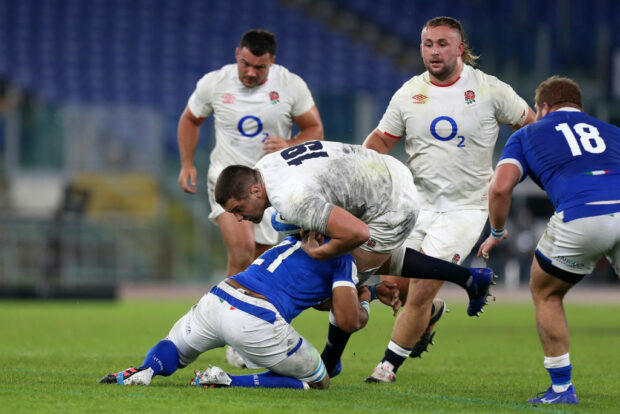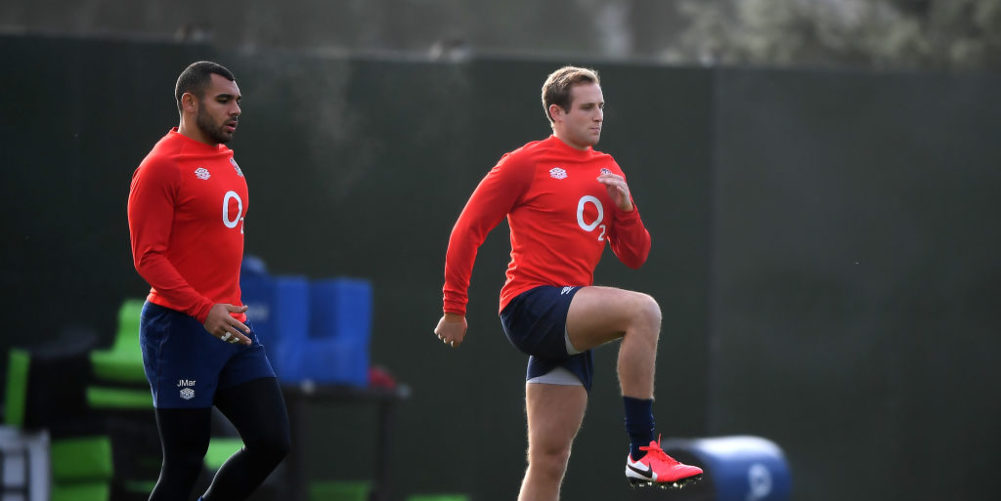EDDIE Jones has Georgia on his mind, with the men from the Caucasus arriving to play their first international at Twickenham on Saturday, as the opener to the new-fangled Autumn Nations Cup. However, what should really be on Fast Eddie’s mind is putting a smile on the faces of England fans by naming a brand-new starting 15 to face the Georgians, featuring none of those who began against Italy.
The England head coach has set out his stall, with winning every game in the tournament at the top of his agenda. It means that Georgia, who are currently batting above their average at 12th in the World Rankings, can expect no quarter from a Red Rose outfit that claimed their third Six Nations title in Jones’ tenure by beating Italy 34-5 in Rome last weekend.
No one should have any quarrel with that objective, but the selection policy that Jones employs to secure a victory over the Georgians is a matter for debate. One of his other main tenets is that international caps have to be earned, rather than given away to players who have had a couple of good Premiership games on the trot. Again, he will not meet with much dissent on that count.
However, what is at issue is how many players Jones has identified as good enough to compete with the incumbents for places in his best starting 15, and how many of them he selects to play against Georgia, before the sterner tests to come in the pool stage against Ireland and Wales.
What he has to weigh in the selection scales is that Georgia have yet to beat any Six Nations side, and are not as successful by any yardstick as Six Nations wooden-spoon monopolists, Italy. Despite a dismal record in Europe’s flagship tournament over the last decade, the Italians have registered six wins over their Six Nations rivals – beating Scotland (2010), France (2011), both France and Ireland (2013), and Scotland again (2015).
There is no denying that multiple Six Nations B champions, Georgia, have not supped at the top table anywhere near as often as Italy, but it is also true that the landmark giant-killing victories that would strengthen their case have proved elusive. This has been the case even during the last two years, when the call for their inclusion in an expanded Six/Seven Nations tournament has been at its loudest.
In 2018 Georgia were beaten not only by Italy (28-17 in Florence), but also in away games against Japan (30-0) and Fiji (37-15). Before the 2019 World Cup they twice lost heavily to Scotland (44-10 at home, and 36-9 away), and during the tournament itself they were on the receiving end against Wales, Fiji and Australia. Last month the direction of travel had not changed, when the Georgians lost 48-7 to Scotland at Murrayfield.
No one wants international rugby to be diminished by mis-matches that become a one-sided procession in which the result is a formality. Mis-matches at international level damage the image of Rugby Union, not only tarnishing this sport in the eyes of its paying public – whether sitting on their sofas, as they are forced to currently, or in a stadium – but also failing to offer a worthwhile contest or experience for the participating teams.
It is why Jones should depart from his usual script of picking his strongest team, and select a complete England second string starting line-up against the Georgians.
This would have the multiple benefits of giving the aspiring players in the England squad a chance to impress Jones in Test conditions, while also providing the head coach with the chance to take a good look at them, rather than relying on bench cameos of ten minutes, or less, on which to formulate his opinions.
Three years before the next World Cup it would also galvanise his starting 23 by sending out a message that the shirts are on loan rather than on long-leases, and that every time they play for England they have to give a performance that asserts their right to start.
At the moment, Six Nations champions or not, there is a sense that some players in the England squad are so unchallenged that a sense of entitlement is seeping into the fabric. There are few signs in the Jones camp of the unrelenting contest for places evident in England’s 2003 world champion squad – and what better way to introduce it than by asking a second string crew that is used to a support role to take the lead against the Georgians.
It ought to present a stern challenge for an England second string, especially in the pack. Georgian rugby has earned the reputation for being not so much a one-trick pony, as a one-trick shire horse. The Georgians pride themselves on heavy-duty forward power, playing a brand of strong-man rugby which has been attributed to the similarities between the 15-man-code and their own ancient sport of Lelo, where from the midpoint between two villages, the men from the competing communities engaged in a battle to wrestle a heavy round ball back to their own village square.
Nick Cain’s England team that should face Georgia:
15 Max Malins; 14 Joe Cokanasiga, 13 Joe Marchant, 12 Ollie Lawrence, 11 Ollie Thorley; 10 Jacob Umaga, 9 Dan Robson; 1 Ellis Genge, 2 Tom Dunn, 3 Will Stuart, 4 Charlie Ewels (capt), 5 David Ribbans, 6 Jack Willis, 7 Ben Earl, 8 Alex Dombrandt
It probably explains why they have such an affinity for scrummaging and mauling, with the spin-off that Georgians are presently propping up half the packs in the French Top 14 with exported front five forwards.
Tank-like front row forwards are a Georgian speciality, with the current incumbents, loosehead Mikhail Nariashvili at Montpellier, tighthead Lesko Kaulashvili at Bordeaux-Begles, and hooker Jaba Bregvadze with the Sunwolves in Japan until recently.
Last year their scrummaging prowess led Jones to invite Georgia to an England training camp in Oxford, before which he dubbed them, “the biggest, ugliest, strongest scrum pack in the world”. The Georgian forwards lived up to the hype when punches were thrown between the two packs during the scrum session.
That makes this re-acquaintance with Georgia at the start of the Autumn Nations Cup an ideal opportunity for the England boss to put a shadow pack of Ellis Genge, Tom Dunn, Will Stuart, Charlie Ewels, David Ribbans, Jack Willis, Alex Dombrandt and Ben Earl to the test.
It will not just be a trial of strength, but a trial of wit and adaptability, to see whether an England unit without a single member of the hard-driving Exeter double-winning pack can emerge on top in a tug-of-war with the Georgians.
It provides a great chance for Genge to demonstrate his dynamism at the scrum, and also as a carrier in the loose against powerful opponents. At 25, the Leicester loosehead will want to take the next step, especially after a season in which the Tigers would have been relegated but for the Saracens salary cap punishment – and also one in which Bath’s Beno Obano has also started to push into international contention.

It could also give Obano’s front row teammates Dunn and Stuart, and lock Ewels, a chance to prove that the forward inconsistency that has been a fault-line at Bath until this season is consigned to the past.
In the back row, it would be fascinating to see whether Willis could break free of the Georgian wrestlers to plunder the breakdown, but with two highly-rated French-based flankers, Beka Gorgadze (Bordeaux-Begles) and Otar Giorgadze (Brive) to contend with, the Wasps turnover specialist might have his work cut out.
The main handicap for the Georgians is that their back play is not of the same calibre as the forwards, and it has been a factor in hobbling their progress as an emerging rugby power.
However, if England are unable to get quick, clean ball for their own backline this could be a worthwhile contest, rather than the foregone conclusion on the two previous meetings between England and Georgia. Both were at World Cups, with England winning 84-6 in Perth in 2003, and 41-10 in Dunedin in 2011.
For once, the England head coach should give Dan Robson a full game in which to show what he can do at scrum-half, while at the same time giving his young Wasps fly-half partner, Jacob Umaga, valuable exposure at international level.
It also offers Jones the opportunity to give Ollie Lawrence a longer run at inside centre, with the option to pair him in midfield with Joe Marchant. Add to that a back three of Ollie Thorley and Joe Cokanasiga on the wings, and the counter-attacking flair of Max Malins at full-back, and no lockdown could contain the sense of anticipation among fans ready to spring from couch to feet in sitting rooms around the country.
Another scenario, if the England backs did not get enough fast ball against the hard-grinding Georgians, is that it would place a premium on their accuracy, ability to communicate, and finishing skills being international quality.
Make Ewels captain, and Robson vice-captain, and make a game of it. And if Fast Eddie is worried it is too much of a gamble, then there’s the insurance policy of a replacements bench which he can stack with stalwarts like Jamie George, Mako Vunipola, Kyle Sinckler, Maro Itoje, Tom Curry, Ben Youngs, Owen Farrell, and Jonny May. That lot should be able to get him out of a tight corner should the need arise.
This fixture against Georgia is the time for a starting line-up which will have the win-win advantage of blooding young players who could be critical to England’s future over the next three years, and beyond, while at the same time giving an edge to an international match which would otherwise be too predictable. Roll the dice, Eddie!
























